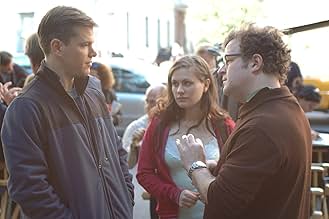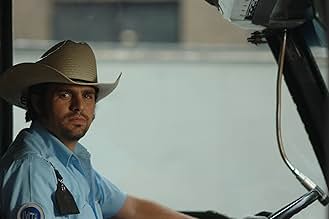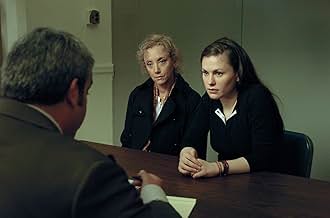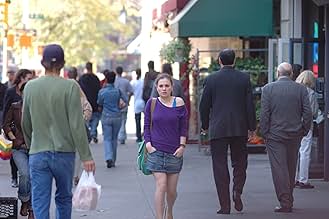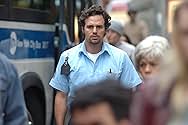PUNTUACIÓN EN IMDb
6,5/10
19 mil
TU PUNTUACIÓN
Una joven es testigo de un accidente de autobús y queda atrapada por las secuelas. La cuestión de si fue o no intencionado afectará a la vida de muchas personas.Una joven es testigo de un accidente de autobús y queda atrapada por las secuelas. La cuestión de si fue o no intencionado afectará a la vida de muchas personas.Una joven es testigo de un accidente de autobús y queda atrapada por las secuelas. La cuestión de si fue o no intencionado afectará a la vida de muchas personas.
- Premios
- 10 premios y 18 nominaciones en total
Reseñas destacadas
10abneuman
A truly heart wrenching story, "Margaret" reiterates Kenneth Lonergan's gifts for dialogue, story, and his ability to treat the most dramatic themes with artful humor, awareness and perception. The acting is exceptional; even relatively small parts, (played by actors such as Matthew Broderick, Matt Damon, Mark Ruffalo, and Allison Janey) showcase both the actors' own remarkable abilities as well as Lonergan's attention to detail. It is Matthew Broderick's character who is the only one to utter the movie's title as he recites a poem by Gerard Manley Hopkins. J. Smith Cameron and Anna Paquin, who play mother and daughter, both deliver fierce performances which form the relationship that serves as the backbone of the film. Taking on issues from abortion, divorce, and death to the inherent isolation of being human, the movie has a life and humor to it which cannot be brought down by the weightiness of these issues.
Shot back in 2005, after a long history of editing problems, this film finally got released in 2011, and debuted on DVD in 2012, with an extended director's cut (I guess) included. Unfortunately, I accidentally watched the shorter (still two and a half hour) version. I'm not sure I'd want to sit through another half hour of this. It's a good film, at its heart. The story is very good, anyway. My big problem with it is that the central character, played by Anna Paquin, is such an unlikeable, pretentious little snot I eventually just stopped caring about what was going on. It's a totally realistic depiction of a teenager, but it reminds me how much I hate teenagers, or at least teenagers like her. Frankly, most of the rest of the characters are equally as obnoxious. I was extremely glad to see Jeannie Berlin call Paquin out on her bullcrap, but she's just as detestable. I found it hilarious that Paquin mistakenly calls her "strident," which she thinks means "pig-headed" or something but which actually means "shrill." The whole film is honestly pretty shrill. The story revolves around Paquin causing a bus accident. At first, she lies about it, then later she feels bad about it and tries to recant her statement.
On the day of its cinema release, Kenneth Lonergan's long-gestating drama was the most successful film in the UK. Problem was, it only opened on one screen. The story of Margaret's production is likely a fascinating story in itself, not least because of Martin Scorsese and Thelma Schoonmaker's input into the final edit, which was presumably a return favour for Lonergan's work on the screenplay for Gangs of New York. But I'll focus on the fascinating story that Lonergan has told with this film.
Ostensibly the tale centres on a New York schoolgirl named Lisa (Anna Paquin, defining her young adulthood just as she defined herself in childhood with The Piano), who inadvertently causes a fatal road accident. What follows is the emotional aftermath, fought outwardly with her mother, as a moral and ethical war wages within her hormone-ravaged body.
The performances are excellent throughout, particularly Paquin and J. Smith-Cameron as the daughter and mother caught in gravitational flux. Jean Reno gives fine support as the sad-sack Ramon, while Matthew Broderick delivers the poem (by Gerard Manley Hopkins) that provides the film's title, while suggesting the entire life of his character by the way he eats a sandwich. It's that kind of film.
I recently wrote a review of Winter's Bone, which I described as an anti-youth movie. Margaret could be a companion piece in this regard, cautioning against the bright-eyed naivety of youthful independence, and promoting the importance of family. Like Winter's Ree, Lisa is a lost soul; unlike Ree, Lisa is not someone we admire. But she is always in focus; Lonergan expects not for us to like her, only to understand her. In maintaining this focus, Lonergan himself achieves the admirable: weaving a narrative whose minute details and labyrinthine arguments mirror the broader existential vista against which they are dwarfed.
Margaret goes deeper than Winter's Bone, delivering something pleasingly unexpected: a kind of Sartrean modern fable about the isolating nature of subjectivity. Like her actor mother on the stage, and like us all in our semi-waking lives, Lisa is the main player in her great opera. She performs the social functions that enable her to cling to a sense of belongingness, but something gnaws at her soul. And when, after the accident, she seeks some kind of meaning, she is met at once by indifference, before being seduced by those very institutions that make indifference normal. Nothing in the material world satisfies Lisa; nothing can match her aspirations. The suggestion here, I feel, is that our despair emerges from the disparity between that which we hope for and that which reality can deliver.
No wonder it took so long to find its way to a single UK screen: a three-hour existentialist play is a tough sell. Ten years after the towers sank to Ground Zero, Margaret joins There Will Be Blood, The Assassination of Richard Nixon, and (for some) Zodiac in the pantheon of modern classics that map the American psyche in the post-9/11 world.
Ostensibly the tale centres on a New York schoolgirl named Lisa (Anna Paquin, defining her young adulthood just as she defined herself in childhood with The Piano), who inadvertently causes a fatal road accident. What follows is the emotional aftermath, fought outwardly with her mother, as a moral and ethical war wages within her hormone-ravaged body.
The performances are excellent throughout, particularly Paquin and J. Smith-Cameron as the daughter and mother caught in gravitational flux. Jean Reno gives fine support as the sad-sack Ramon, while Matthew Broderick delivers the poem (by Gerard Manley Hopkins) that provides the film's title, while suggesting the entire life of his character by the way he eats a sandwich. It's that kind of film.
I recently wrote a review of Winter's Bone, which I described as an anti-youth movie. Margaret could be a companion piece in this regard, cautioning against the bright-eyed naivety of youthful independence, and promoting the importance of family. Like Winter's Ree, Lisa is a lost soul; unlike Ree, Lisa is not someone we admire. But she is always in focus; Lonergan expects not for us to like her, only to understand her. In maintaining this focus, Lonergan himself achieves the admirable: weaving a narrative whose minute details and labyrinthine arguments mirror the broader existential vista against which they are dwarfed.
Margaret goes deeper than Winter's Bone, delivering something pleasingly unexpected: a kind of Sartrean modern fable about the isolating nature of subjectivity. Like her actor mother on the stage, and like us all in our semi-waking lives, Lisa is the main player in her great opera. She performs the social functions that enable her to cling to a sense of belongingness, but something gnaws at her soul. And when, after the accident, she seeks some kind of meaning, she is met at once by indifference, before being seduced by those very institutions that make indifference normal. Nothing in the material world satisfies Lisa; nothing can match her aspirations. The suggestion here, I feel, is that our despair emerges from the disparity between that which we hope for and that which reality can deliver.
No wonder it took so long to find its way to a single UK screen: a three-hour existentialist play is a tough sell. Ten years after the towers sank to Ground Zero, Margaret joins There Will Be Blood, The Assassination of Richard Nixon, and (for some) Zodiac in the pantheon of modern classics that map the American psyche in the post-9/11 world.
Margaret is a well written coming of age drama, but the protagonist is not a sympathetic character, which is going to alienate a lot of the audience right off the bat. The girl behind me as I left the theater didn't like it, telling her friend, "I just couldn't stand Anna Paquin's character." The screenplay is deft at shorthanding idiosyncratic, complicated personalities with naturalistic dialogue. It also helps that every role in the film, including almost every minor part, is cast with a top notch actor. But for all the big Hollywood names, my props go to J. Smith-Cameron for a theater-grade performance scaled down to fit the intimacy of a close up shot. The movie explores the milieu of affluent teenagers attending an upscale school in New York City, and one of the other reviewers here is right in saying it resembles a French film in that it takes an mature approach to depicting adolescents, showing them as smart, complicated, sexual, uncertain. Most mainstream reviewers seem puzzled as to what they should think about it. I think it's over their heads, the elliptical, dialogue heavy, character driven narrative style, as well as the lack of an easy, simple take-away moral, seems to have befuddled them. Maybe we should rope in some theater critics' opinions instead.
Margaret (2011)
A terrific, evolving, and in-obvious story line mixed with a lead performance by Anna Paquin to die for makes "Margaret" fabulous. See it for her performance alone.
If you think this is a new movie you'll notice some famous actors who look rather young--Matt Damon in particular in his role as a likable high school teacher. That's because it was filmed in 2005 (and got held up in post-production). Even so it doesn't feel dated. The main themes hold up really well, and are told with unusually frank terms. Many people really are just greedy and selfish at heart.
The key event happens early on and in a way can't even be mentioned here. But it's safe to say that Paquin, who's character is called Lisa Cohen, at first takes a false stance in a moment of crisis and compassion. But the truth of the matter eats at her, and against the rising tide of people who prefer the lie she becomes increasingly principled. In the end it is almost everyone who is morally corrupt, even in his own way her teacher.
There is one lurking problem to the movie that really hurt it. One is the way the initial crisis is filmed (with Mark Ruffalo as a bus driver). It is exaggerated and makes the circumstances leading to tragedy unlikely just when the rest of the movie depends on likelihood. Since this is the lynchpin of everyone's reactions later on, it matters rather too much to ignore.
But the rest of it, from the main plot and Paquin to the various sub-plots including a romantic affair her mother has and some political conflicts about Arab-Israeli relations and the 9/11 events, is all really sharply delineated and well acted. And it's written with a good ear for dialog. It simply makes sense. The fact that there is no silver lining here, and that people are shown so obviously ugly below the surface, is harder to do than you might think. All admirable stuff.
A terrific, evolving, and in-obvious story line mixed with a lead performance by Anna Paquin to die for makes "Margaret" fabulous. See it for her performance alone.
If you think this is a new movie you'll notice some famous actors who look rather young--Matt Damon in particular in his role as a likable high school teacher. That's because it was filmed in 2005 (and got held up in post-production). Even so it doesn't feel dated. The main themes hold up really well, and are told with unusually frank terms. Many people really are just greedy and selfish at heart.
The key event happens early on and in a way can't even be mentioned here. But it's safe to say that Paquin, who's character is called Lisa Cohen, at first takes a false stance in a moment of crisis and compassion. But the truth of the matter eats at her, and against the rising tide of people who prefer the lie she becomes increasingly principled. In the end it is almost everyone who is morally corrupt, even in his own way her teacher.
There is one lurking problem to the movie that really hurt it. One is the way the initial crisis is filmed (with Mark Ruffalo as a bus driver). It is exaggerated and makes the circumstances leading to tragedy unlikely just when the rest of the movie depends on likelihood. Since this is the lynchpin of everyone's reactions later on, it matters rather too much to ignore.
But the rest of it, from the main plot and Paquin to the various sub-plots including a romantic affair her mother has and some political conflicts about Arab-Israeli relations and the 9/11 events, is all really sharply delineated and well acted. And it's written with a good ear for dialog. It simply makes sense. The fact that there is no silver lining here, and that people are shown so obviously ugly below the surface, is harder to do than you might think. All admirable stuff.
¿Sabías que...?
- CuriosidadesOriginally scheduled for release in 2007, but writer/director Kenneth Lonergan spent four more years struggling with Fox Searchlight Pictures over the final cut, resulting in several lawsuits.
- PifiasWhen Lisa comes home after the accident, throws up and hugs her mother, there's no blood on her arms and hands. In the next shots under the shower, there is plenty.
- Versiones alternativasExtended version released on DVD runs for 178 minutes.
- ConexionesFeatured in Maltin on Movies: Ice Age: Continental Drift (2012)
Selecciones populares
Inicia sesión para calificar y añadir a tu lista para recibir recomendaciones personalizadas
Detalles
Taquilla
- Presupuesto
- 14.000.000 US$ (estimación)
- Recaudación en Estados Unidos y Canadá
- 46.495 US$
- Fin de semana de estreno en EE. UU. y Canadá
- 7525 US$
- 2 oct 2011
- Recaudación en todo el mundo
- 469.264 US$
- Duración2 horas 30 minutos
- Color
- Mezcla de sonido
- Relación de aspecto
- 1.85 : 1
Contribuir a esta página
Sugerir un cambio o añadir el contenido que falta

Principal laguna de datos
By what name was Margaret (2011) officially released in India in Hindi?
Responde



